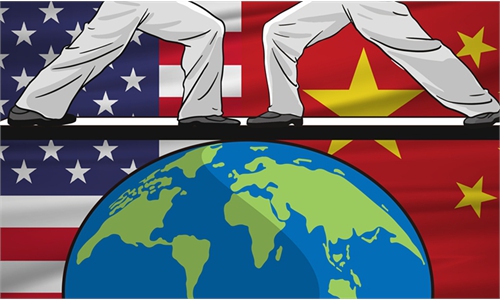
Illustration: Liu Rui/GT
When Washington resorts to the term "like-minded" to curry favor with its allies and partners whom it deems could serve its strategic objectives, it has never truly thought about what is in their minds.Against the backdrop of souring China-Australia relations and after China suspended taking Australia's coal shipments in October, exports from the US have filled some of the void. China's customs data showed that only in February, the US sold nearly 300,000 tons of coking coal to China from nearly zero in October.
The figure is enough to make Australia frustrated - Australia has taken the initiative to worsen its ties with China by standing with the US, provoking China on several fronts, and now has been eating the bitterness of trade disruptions with China. Nonetheless, the US has exploited the chance to fill the vacuum left by Australia; in other words, the US sold Australia out, while Australia loyally counted the money for the US.
India, another "like-minded" partner of the US, is experiencing another severe wave of the COVID-19 epidemic. Even UK Prime Minister Boris Johnson and Japanese Prime Minister Yoshihide Suga cancelled their planned visits to the country. India's medical system has been overwhelmed and the country faces a vaccine shortage. But the US seems not to care about what India badly needs now.
Indian health officials have appealed the US to lift a ban on exports of raw materials needed to make COVID-19 vaccines, which the US had invoked as part of the Defense Production Act to keep the materials on its own shores. In a tweet, the Serum Institute of India urged US President Joe Biden to lift that embargo. However, the White House on Monday did not respond to questions regarding the request when asked twice by reporters.
Although the US has changed another president, "America First," the core of its foreign policy, does not change, and the US places self-interests above those of any other country, including its allies. When Washington needs its allies and partners to confront China, it talks up "like-mindedness" to ask them to act as a pawn. Whenever US interests are concerned, the US will not hesitate to secure them even at the cost of the interests of its allies and partners. The cases of Australia and India are exemplary.
For these allies and partners of the US, is sacrificing their own interests for US geopolitical ambitions worthwhile? Hyping the so-called China aggression and China threat could bind all these "like-minded" countries together, but the reality is that their interests in regard to China are too diverse.
US President Biden will hold the Leaders' Climate Summit on Thursday as a means to restore US global leadership. While Washington is eager to resume global leadership, it remains uncertain whether it truly wants to fulfill its commitment. After all, the US is good at talking big, but delivers little. And the "like-minded' countries better bear this in mind. What is in the mind of the US is maximizing its own interests. In its alliances and partnerships, the US is only keen on demanding instead of giving, and what it could give, if anything, is lip service. Given US strategic selfishness, the US will only create trouble for its allies and partners on their way of development so that they will be more subjected to US hegemony and find it more difficult to be independent. Relying on the empty words of the US and serving as US henchmen will only cost themselves in the end.




